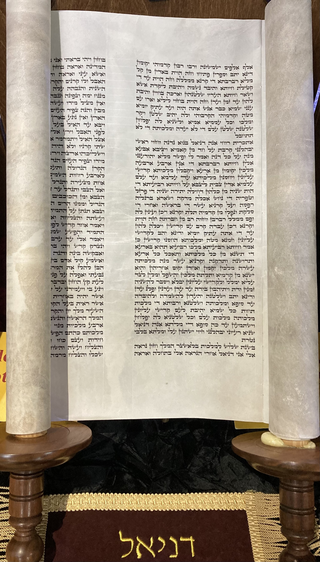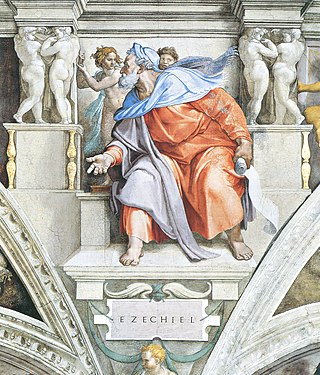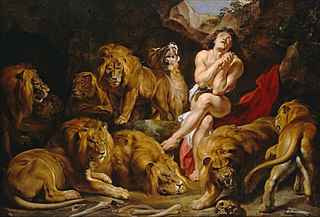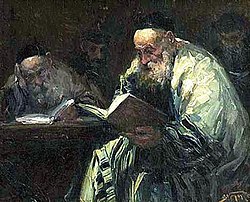
The Book of Daniel is a biblical apocalypse authored during the 2nd century BC, and set during the 6th century BC. The work describes "the activities and visions of Daniel, a noble Jew exiled at Babylon"; in doing so, it interpolates a portrayal of a historical prophecy being fulfilled with a prediction of future cosmic and political upheaval. This eschatology ultimately affirms that the God of Israel's previous deliverance of Daniel from his enemies prefigures his future deliverance of the people of Israel from their present oppression.

Ezekiel or Ezechiel was an Israelite priest. He is the eponymous protagonist of the Book of Ezekiel in the Hebrew Bible.

Belshazzar was the son and crown prince of Nabonidus, the last king of the Neo-Babylonian Empire. Through his mother, he might have been a grandson of Nebuchadnezzar II, though this is not certain and the claims to kinship with Nebuchadnezzar may have originated from royal propaganda.

In the Hebrew Bible, Nahshon was a tribal leader of the Judahites during the wilderness wanderings of the Book of Numbers. In the King James Version, the name is spelled Naashon, and is within modern Rabbinical contexts often transliterated as Nachshon.
According to Jewish tradition the Great Assembly was an assembly of possibly 120 scribes, sages, and prophets, which existed from the early Second Temple period to the early Hellenistic period, roughly coinciding with the Persian hegemony over the nation of Israel. The assembly's members, known as Anshei Knesset HaGedolah, traditionally included such figures as Haggai, Zechariah, Malachi, Ezra, Nehemiah, Daniel, Hananiah, Mishael, Azariah, Mordechai and Zerubbabel.
Bible prophecy or biblical prophecy comprises the passages of the Bible that are claimed to reflect communications from God to humans through prophets. Christians usually consider the biblical prophets to have received revelations from God.
Simeon ben Azzai or simply Ben Azzai was a distinguished tanna of the first third of the 2nd century.

Nitzavim, Nitsavim, Nitzabim, Netzavim, Nisavim, or Nesabim is the 51st weekly Torah portion in the annual Jewish cycle of Torah reading and the eighth in the Book of Deuteronomy. It comprises Deuteronomy 29:9–30:20. In the parashah, Moses told the Israelites that all the people stood before God to enter into the covenant, violation of which would bring on curses, but if they returned to God and heeded God's commandments, then God would take them back in love and bring them together again from the ends of the world. Moses taught that this Instruction was not beyond reach, and Moses put before the Israelites life and death, blessing and curse, and exhorted them to choose life by loving God and heeding the commandments.
Joshua ben Hananiah, also known as Rabbi Yehoshua, was a leading tanna of the first half-century following the destruction of the Second Temple. He is the seventh-most-frequently mentioned sage in the Mishnah.
Hanina ben Pappa was a Jewish Talmudist living in the Land of Israel, halakhist, and aggadist who flourished in the 3rd and 4th centuries.

Hananiah, Mishael, and Azariah are figures from chapter 3 of the biblical Book of Daniel. In the narrative, the three Jewish men are thrown into a fiery furnace by Nebuchadnezzar II, King of Babylon for refusing to bow to the king's image. The three are preserved from harm and the king sees four men walking in the flames, "the fourth ... like a son of God". They are first mentioned in Daniel 1, where alongside Daniel they are brought to Babylon to study Chaldean language and literature with a view to serving at the King's court, and their Hebrew names are replaced with Chaldean or Babylonian names.

In the Abrahamic religions, the voice of God is a communication from God to human beings through sound with no known physical source.

Daniel is the main character of the Book of Daniel. According to the Hebrew Bible, Daniel was a noble Jewish youth of Jerusalem taken into captivity by Nebuchadnezzar II of Babylon, serving the king and his successors with loyalty and ability until the time of the Persian conqueror Cyrus, all the while remaining true to the God of Israel. While some conservative scholars hold that Daniel existed and his book was written in the 6th century BCE, most scholars agree that Daniel is not a historical figure and that much of the book is a cryptic allusion to the reign of the 2nd century BCE Hellenistic king Antiochus IV Epiphanes.
In Judaism, the Holy Spirit refers to the divine force, quality, and influence of God over the universe or over God's creatures, in given contexts.
Hanina(h) ben Ahi Rabbi Joshua, or Hananiah ben Ahi Rabbi Joshua, meaning 'Haninah/Hananiah son of the brother of Rabbi Yehoshua' was a Jewish Tanna sage of the third generation. Unlike many other Tannaitic sages, he is not recognized by his father's name, but rather with his uncle's name, R. Joshua ben Hananiah. He does not appear on the Mishnah at all. Sometimes he is recorded in baraitas as merely Hananiah, which can lead to confusion with Hananiah ben Akavia.

Daniel in the lions' den tells of how the biblical Daniel is saved from lions by the God of Israel "because I was found blameless before him". It parallels and complements chapter 3, the story of Shadrach, Meshach, and Abednego: each begins with the jealousy of non-Jews towards successful Jews and an imperial edict requiring them to compromise their religion, and concludes with divine deliverance and a king who confesses the greatness of the God of the Jews and issues an edict of royal protection. The tales making up chapters 1–6 of Daniel date no earlier than the Hellenistic period and were probably originally independent, but were collected in the mid-2nd century BC and expanded shortly afterwards with the visions of the later chapters to produce the modern book.

The Daniel Fast, in Christianity, is a partial fast, in which meat, dairy, alcohol, and other rich foods are avoided in favor of vegetables and water in order to be more sensitive to God. The fast is based on the lifelong kosher diet of the Jewish prophet Daniel in the biblical Book of Daniel and the three-week mourning fast in which Daniel abstained from all meat and wine. Among Catholic and Mainline Protestant Christians, the Daniel Fast has been practiced by some during the 40-day season of Lent, though the Daniel Fast can variously be set at three weeks, or even ten days. As such, evangelical Christian churches such as those of the Baptist tradition, have partaken in the fast at various times of the year. The passage in Chapter 1 refers to a 10-day test wherein Daniel and others with him were permitted to eat vegetables and water to avoid the Babylonian king's food and wine. After remaining healthy at the end of the 10-day period, they continued the vegetable diet for the three years of their education. The passage in Chapter 10 refers to a three-week fast of no meat, wine, or rich food. In addition to the practices of fasting and abstinence undertaken during the Daniel Fast, Christians may also add spiritual disciplines such as daily church attendance, increased prayer, as well as the reading of Sacred Scripture and a daily devotional.

Daniel 1 tells how Daniel and his three companions were among captives taken by Nebuchadnezzar II from Jerusalem to Babylon to be trained in Babylonian wisdom. There they refused to take food and wine from the king and were given knowledge and insight into dreams and visions by God, and at the end of their training they proved ten times better than all the magicians and enchanters in the kingdom.
Lulianos and Paphos were two wealthy Jewish brothers who lived in Laodicea on the Lycus in Anatolia, contemporaries with Joshua ben Hananiah, and who suffered martyrdom at the hands of the Roman legate.













